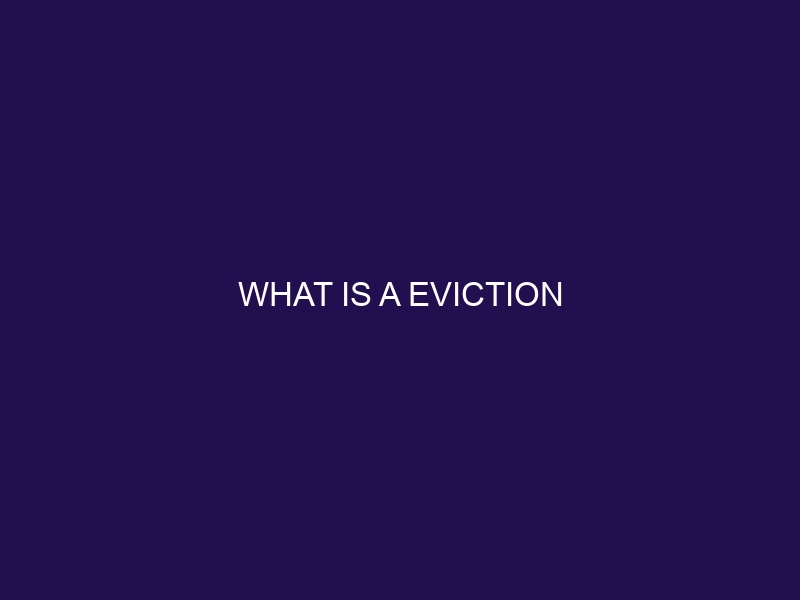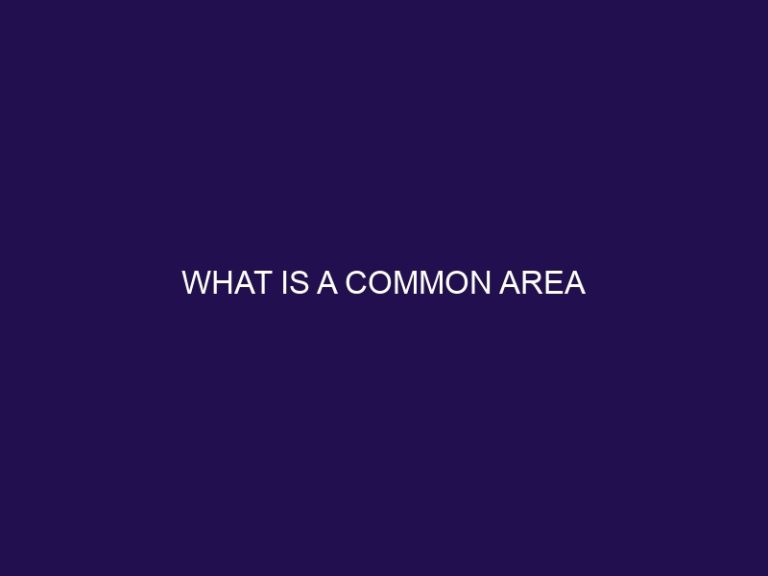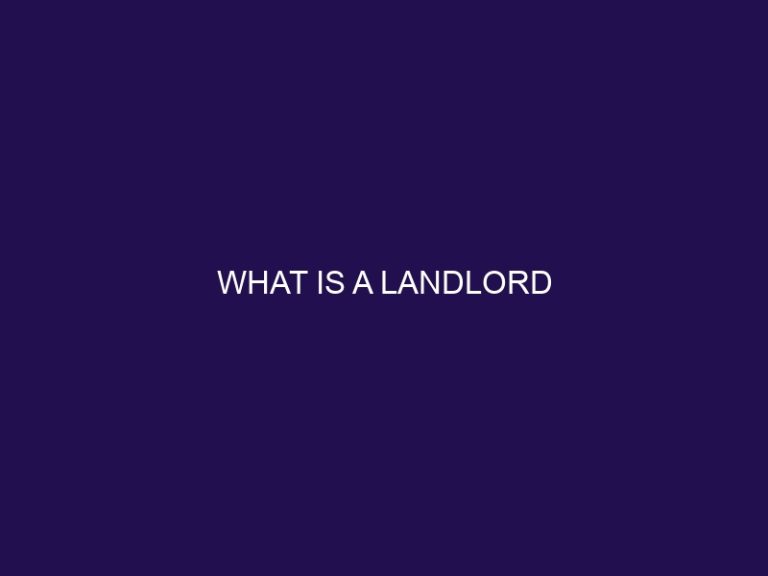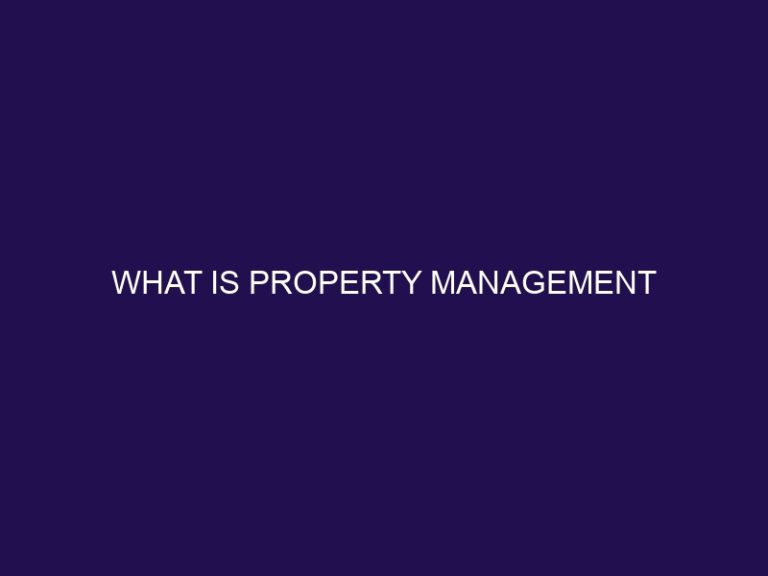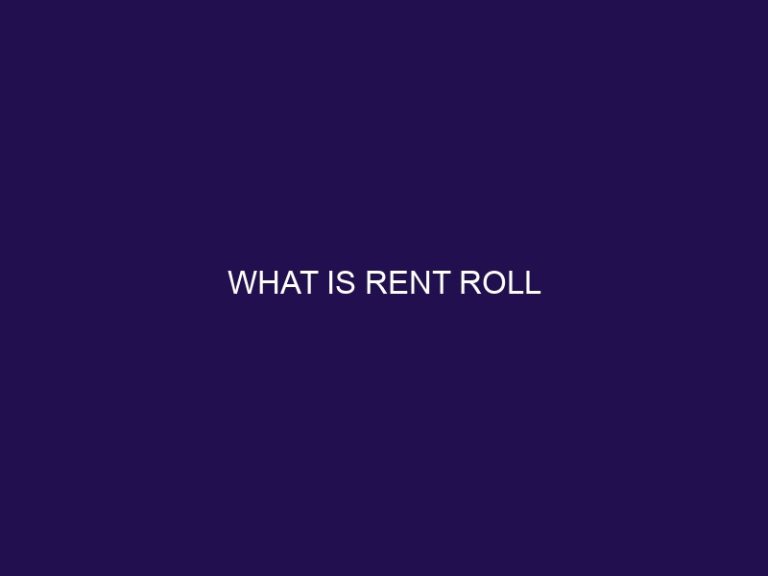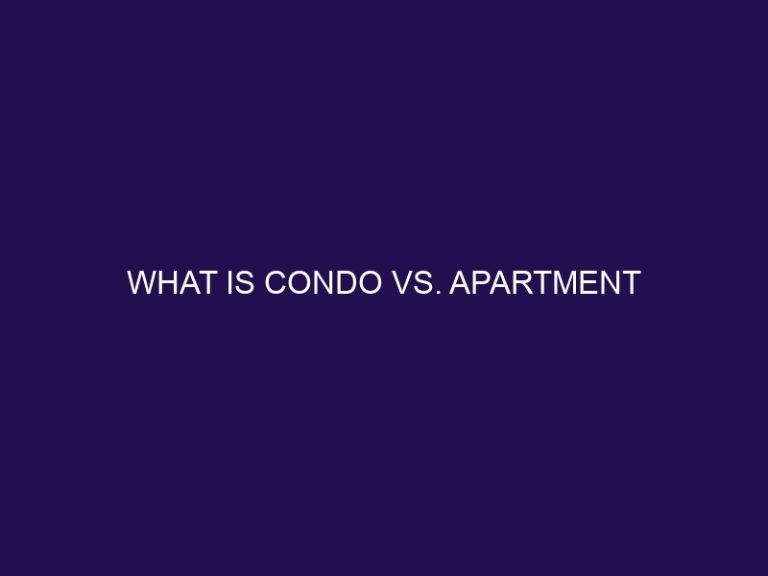What is a Eviction
Eviction is a legal process through which a landlord removes a tenant from a property due to various reasons, such as non-payment of rent, lease violations, illegal activities, or nuisance behavior. Understanding the concept of eviction and its different aspects is crucial for both tenants and landlords.
Definition of Eviction: Eviction refers to the legal action taken by a landlord to forcibly remove a tenant from the rented property.
Purpose of Eviction: The primary purpose of eviction is to protect the rights and interests of landlords by ensuring that tenants comply with the terms of the lease agreement and fulfill their financial obligations.
Types of Evictions: There are different types of evictions, including residential evictions, commercial evictions, and constructive evictions. Each type has its own unique considerations and legal requirements.
Reasons for Eviction: The reasons for eviction may vary, but some common ones include non-payment of rent, violation of lease terms, engagement in illegal activities, and disruptive or nuisance behavior that disturbs other tenants or neighbors.
The Eviction Process: The process of eviction typically involves several steps, starting with a notice of eviction, followed by the filing of an eviction lawsuit, court hearings, judgment, and finally, the enforcement of the eviction.
Rights and Responsibilities: Both tenants and landlords have rights and responsibilities during the eviction process. Understanding these rights and responsibilities is essential to ensure a fair and lawful eviction procedure.
Eviction Prevention: To help prevent eviction, certain measures can be taken, such as open communication and mediation between tenants and landlords, timely rent payment, compliance with lease terms, and seeking legal assistance when needed.
By understanding what eviction entails, its different types, reasons, and the necessary steps to take, both tenants and landlords can navigate the eviction process more effectively and ensure a fair resolution to any disputes that may arise.
What is an Eviction?
Curious about evictions? Let’s dig into what they really are and uncover their purpose. We’ll start by exploring the definition of eviction, getting to the core of what it means to be ousted from one’s living situation. Then, we’ll dive into the purpose behind evictions, shedding light on why landlords and authorities take such actions. Get ready for a revealing look at the world of evictions, no stone left unturned.
Definition of Eviction
Eviction is the legal process of removing a tenant from a rented property due to violations, non-payment of rent, or other specified reasons. It involves various steps, including a notice of eviction, filing a lawsuit, a court hearing and judgment, and finally the enforcement of eviction. The purpose of eviction is to protect the rights and responsibilities of both tenants and landlords. It is crucial for tenants to be aware of their rights, while landlords have a responsibility to uphold the terms of the lease agreement. Preventing eviction can be achieved through effective communication, timely rent payments, compliance with lease terms, and seeking legal assistance when necessary. The Definition of Eviction is a legal procedure used to forcibly remove a tenant from a rental property because of their violation, failure to pay rent, or other specific grounds. This process is designed to safeguard the rights and obligations of both landlords and tenants. It is imperative for tenants to understand their rights, while landlords must adhere to the lease agreement terms. Avoiding eviction can be accomplished by maintaining open lines of communication, submitting rent payments on time, following lease conditions, and getting legal help when needed.
Purpose of Eviction
The purpose of eviction is to legally remove a tenant from a property due to various reasons such as non-payment of rent, violation of lease terms, illegal activities, or nuisance behavior. Understanding the purpose of eviction helps both landlords and tenants maintain a fair and respectful rental relationship. It serves as a final resort when communication and mediation fail to resolve the issues. The primary objective is to protect the rights of the landlord and maintain a safe and conducive environment for other tenants. Proactively preventing eviction can be achieved through open communication, timely rent payment, adherence to lease terms, and seeking legal assistance if necessary. Remember, open communication and addressing concerns promptly can often help resolve issues and avoid the need for eviction.
Types of Evictions
Unraveling the world of evictions, let’s dig into the different types that exist. Brace yourself as we explore the realms of residential evictions, commercial evictions, and even the intriguing realm of constructive evictions. Get ready to uncover the unique characteristics and underlying factors that drive each type. From homes to businesses, and even the unexpected, we’ll delve into the various dimensions of the eviction landscape.
Residential Evictions
- Residential evictions can be a complex process, but understanding the steps involved can help both tenants and landlords navigate the situation. Here are the key steps in a residential eviction:
- Notice of residential evictions: The landlord must provide a written notice to the tenant stating the reason for eviction and a specified timeframe to remedy the issue.
- Filing an eviction lawsuit: If the tenant does not comply with the notice or resolve the issue, the landlord can file a lawsuit in court.
- Court hearing and judgment: Both parties present their case to a judge who then makes a decision on whether residential evictions is warranted.
- Enforcement of residential evictions: If the judge rules in favor of eviction, the landlord can proceed with removing the tenant from the property.
Understanding these steps can help tenants protect their rights and landlords follow the proper legal procedures in residential evictions.
Commercial Evictions
Commercial evictions, also known as the process of removing a tenant from a commercial property, can occur due to various reasons such as non-payment of rent, violation of lease terms, or engaging in illegal activities. The main objective behind commercial evictions is to safeguard the landlord’s rights and ensure the smooth functioning of business operations. This process typically entails serving a notice to the tenant, initiating an eviction lawsuit, attending a court hearing, and ultimately enforcing the eviction if approved by the court. To prevent commercial evictions, it is essential to maintain effective communication, make timely rent payments, adhere to lease terms, and seek legal assistance whenever necessary.
In a historical context, an interesting case of commercial evictions took place in 1977 in New York City. This case involved the eviction of several small businesses located in the SoHo neighborhood to make space for luxury housing developments. The incident sparked widespread protests and triggered extensive debates regarding the gentrification of urban areas and the preservation of local businesses. Subsequently, this particular case led to the implementation of more stringent regulations and enhanced protections for commercial tenants within the city.
Constructive Evictions
Constructive evictions occur when landlords make a property uninhabitable, forcing tenants to leave. This can include actions like shutting off utilities, failing to make necessary repairs, or engaging in harassment. While constructive evictions are not legal, tenants can respond by terminating their lease agreement without penalty. It’s important for tenants to document any evidence of the landlord’s actions and consult with a lawyer to ensure they understand their rights.
Fact: Did you know that constructive eviction is often considered a form of landlord retaliation against tenants who assert their rights?
Reasons for Eviction
Discover the reasons behind evictions in this insightful section. From non-payment of rent to violation of lease terms, illegal activities, and nuisance behavior, we’ll uncover the various circumstances that can lead to eviction. Learn more about the factors involved and gain a deeper understanding of the complexities surrounding this significant issue.
Non-payment of Rent
When it comes to eviction, non-payment of rent is one of the most common reasons. Landlords have the right to evict tenants who fail to pay their rent on time. The issue of non-payment of rent can lead to financial difficulties for landlords and disrupt the cash flow of the rental property. To prevent eviction due to non-payment of rent, tenants should prioritize timely rent payment. If tenants face difficulties in paying, open communication with the landlord and seeking legal assistance can help resolve the issue. Exploring options for mediation and negotiating a payment plan can also be beneficial in avoiding eviction. Remember, timely rent payment is crucial in maintaining a good relationship with your landlord and ensuring a peaceful tenancy.
Violation of Lease Terms
Violations of lease terms can lead to eviction, which is a common consequence. Landlords have the right to evict tenants if they breach the lease agreement. Some examples of lease violations include:
- Non-payment of rent: Failing to pay rent on time or in full.
- Unauthorized pets or guests: Keeping pets or having guests without obtaining permission.
- Property damage: Intentionally or negligently causing damage to the rental property.
- Engaging in illegal activities: Participating in illegal activities on the premises.
- Excessive noise or disturbance: Disturbing the peace or creating a nuisance.
Tenants can prevent eviction for lease violations by following these guidelines:
- Thoroughly read and comprehend the lease agreement.
- Adhere to all terms and conditions stated in the agreement.
- Maintain open communication with the landlord to resolve concerns or issues.
- Seek legal assistance promptly when facing eviction.
Illegal Activities
Engaging in illegal activities is a grave cause for eviction. Landlords possess the authority to terminate the tenancy of tenants who partake in criminal behavior within the rental property. Examples of unlawful activities that can result in eviction include drug-related offenses, property damage, assault, and illegal subletting. In such instances, landlords typically issue a notice to the tenant, granting them an opportunity to rectify the situation or vacate the premises. Should the tenant fail to comply, the landlord may initiate an eviction lawsuit and pursue a court order to regain possession of the property. It is crucial for both landlords and tenants to comprehend their rights and responsibilities in regards to eviction as a consequence of illegal activities. Seeking legal assistance can facilitate navigating the intricate eviction process.
Nuisance Behavior
When it comes to evictions, nuisance behavior can be a valid reason for a landlord to take action. Nuisance behavior refers to actions or behaviors that disrupt the peace, comfort, or safety of other tenants or the property itself.
- Noise disturbances, such as loud parties or excessive music.
- Illegal activities, like drug use or dealing.
- Damage to the property, such as vandalism or destruction of shared spaces.
- Harassment or threats towards neighbors or property management.
To prevent nuisance behavior, clear communication and establishing rules can make a big difference. It’s important for tenants to be respectful of others and to report any issues promptly. Landlords should address complaints promptly and take appropriate action as necessary to maintain a peaceful and safe living environment for all.
The Eviction Process
The eviction process can be a daunting and complex journey to navigate. In this section, we’ll explore the key stages involved, shedding light on the notice of eviction, filing an eviction lawsuit, court hearings and judgments, and the subsequent enforcement of the eviction. Get ready to uncover the crucial steps that landlords and tenants must undertake as they navigate through this intricate process. So, buckle up and let’s dive into the ins and outs of eviction procedures.
Notice of Eviction
When facing an eviction, receiving a notice of eviction is a crucial step in the process. The notice of eviction serves as a formal communication from the landlord to the tenant, informing them of the landlord’s intention to terminate the tenancy. It outlines the specific reasons for the eviction, such as non-payment of rent, lease violations, or illegal activities. The notice of eviction provides the tenant with an opportunity to address the issues before further legal action is taken. It is important for tenants to carefully read and understand the notice of eviction, seek legal advice if needed, and take appropriate action to avoid eviction.
True story: Susan, a single mother, received a notice of eviction due to falling behind on her rent. Panicked and unsure of her options, Susan reached out to a local tenant advocacy group for help. With their assistance, Susan was able to negotiate a repayment plan with her landlord and avoid eviction. The notice of eviction served as a wake-up call for Susan, prompting her to seek assistance and take proactive steps to address her financial situation.
Filing an Eviction Lawsuit
- Initiating a legal action: Start the process of filing an eviction lawsuit by diligently following the required steps to guarantee compliance with the law and to safeguard the rights of both landlords and tenants.
- Evaluating the lease agreement: Thoroughly examine the terms outlined in the lease agreement to pinpoint any breaches committed by the tenant.
- Sending a formal notice: Furnish the tenant with a written notification that clearly states the reasons behind the eviction and specifies a deadline for resolving the matter.
- Lodging a complaint: Prepare and submit the eviction lawsuit to the appropriate court, making sure all mandatory documentation is included.
- Serving the tenant: Deliver a copy of the complaint to the tenant, adhering to the legal guidelines that dictate proper service.
- Attending the court hearing: Present supporting evidence and persuasive arguments in favor of the eviction case during the court hearing.
- Obtaining a judgment: If the court rules in favor of the eviction, obtain a legally binding judgment that grants the eviction and outlines the designated timeframe for the tenant to vacate the property.
- Executing the eviction: In the event that the tenant fails to comply with the eviction order, coordinate with local authorities to enforce the eviction.
Court Hearing and Judgment
During the eviction process, the court hearing and judgment are of utmost importance. Once an eviction lawsuit is filed, both the tenant and landlord will be given the opportunity to present their case before a judge. The court hearing serves as a platform for each party to present evidence, witness testimonies, and arguments to support their respective positions. Subsequently, the judge evaluates the presented information and issues a judgment. This judgment may be in favor of the landlord, resulting in eviction, or in favor of the tenant, leading to the dismissal of the case. It is crucial for both parties to adequately prepare for the court hearing to ensure a fair and just judgment is made.
Enforcement of Eviction
- Enforcement notice: Provide the tenant with a written notice stating the reason for eviction and the time frame to vacate, in order to enforce the eviction.
- Initiate eviction lawsuit: If the tenant fails to comply with the enforcement notice, file an eviction lawsuit in the appropriate court to legally enforce the eviction.
- Attend court hearing: Both the landlord and the tenant will have the opportunity to present their case before a judge in order to enforce the eviction.
- Obtain judgment: If the judge rules in favor of the landlord, a judgment for eviction will be issued to enforce the eviction.
- Enforce eviction: The landlord can then work with law enforcement to physically remove the tenant from the property and enforce the eviction.
Fact: In some cases, a sheriff or marshal may be involved to ensure a peaceful and legal enforcement of eviction process.
Rights and Responsibilities
A closer look at the rights and responsibilities surrounding eviction reveals the importance of understanding both tenants’ rights and landlords’ responsibilities. Get ready to dive into the key aspects of these sub-sections, uncovering what tenants are entitled to and what obligations landlords must fulfill. With insightful facts and real-life examples, this exploration will shed light on the intricate dynamics that shape the eviction process. Stay tuned for a comprehensive understanding of the rights and responsibilities involved when it comes to eviction.
Tenant’s Rights
Understanding Tenant’s Rights is essential when facing the possibility of eviction. It is crucial to have knowledge of your rights as a tenant to ensure a fair and legal eviction process. Some key rights that tenants have include the right to receive proper notice before eviction, the right to contest the eviction in court, and the right to a habitable living space. If you believe that your rights as a tenant are being violated, it is recommended to seek legal assistance.
Similarly, one significant historical event that exemplified the importance of Tenant’s Rights took place in the early 20th century. The New York rent strikes of 1907 and 1919 were notable movements led by tenants who demanded fair treatment and affordable housing. These strikes played a crucial role in bringing about legislative changes and increasing awareness of Tenant’s Rights throughout the United States.
Landlord’s Responsibilities
Landlords have several responsibilities when it comes to handling evictions:
- Provide proper notice: Landlords must give tenants notice before proceeding with an eviction, following the legal requirements of the jurisdiction.
- Follow the eviction process: Landlords should abide by the eviction process outlined by the law, including filing the necessary paperwork and attending court hearings.
- Maintain habitable premises: It is the landlord’s responsibility to ensure that the rental property meets health and safety standards.
- Respect tenant’s rights: Landlords must respect the rights of their tenants, including privacy, quiet enjoyment, and non-retaliation.
To avoid eviction situations, landlords should maintain open communication with tenants, address any concerns promptly, and consider alternative solutions before resorting to eviction.
Eviction Prevention
Don’t let the fear of eviction loom over you. In this section, we’ll dive into eviction prevention strategies that can significantly reduce the risk of losing your home. From effective communication and mediation techniques to ensuring timely rent payments and complying with lease terms, we’ll explore practical ways to safeguard your tenancy. And if things take a turn for the worse, we’ll also discuss the importance of seeking legal assistance. Stay proactive and in control – let’s tackle eviction head-on.
Communication and Mediation
Communication and mediation play a crucial role in preventing evictions and resolving conflicts between tenants and landlords. Effective communication serves as a medium for both parties to express their concerns and gain an understanding of each other’s viewpoints. Furthermore, it enables them to collaborate towards a mutually beneficial resolution. Mediation, with the assistance of a neutral third party, establishes a structured environment conducive to open dialogue and negotiation. This process aids in finding common ground, exploring alternative solutions, and reaching agreements that effectively circumvent legal proceedings and potential eviction. By prioritizing communication and embracing mediation, tenants and landlords can successfully navigate disputes, uphold positive relationships, and steer clear of the adverse repercussions associated with eviction.
Timely Rent Payment
Ensuring timely rent payment is essential for tenants in order to avoid eviction and maintain a positive relationship with landlords. Here are some valuable tips that can help you make your rent payment on time:
- Set reminders: Utilize applications or calendars to prompt yourself about the due date.
- Automate payments: Implement automatic transfers to guarantee that rent is paid punctually.
- Budget wisely: Strategize your expenses accordingly, giving priority to the rent payment.
- Communicate: If you predict any difficulties, make sure to inform your landlord in advance and collaborate on a payment plan.
Compliance with Lease Terms
Compliance with lease terms is of utmost importance in order to avoid eviction. It is crucial for tenants to fully grasp and fulfill their responsibilities as outlined in the lease agreement. This encompasses timely rent payment, property maintenance, and adherence to any specified restrictions or regulations within the lease. Landlords equally bear the responsibility of ensuring the fairness and reasonableness of the lease terms. Effective communication and prompt resolution of any issues can significantly minimize misunderstandings and the risk of eviction. Seeking legal assistance is advisable when navigating lease agreements and resolving disputes, as it can provide valuable guidance and support. By prioritizing compliance with lease terms, both tenants and landlords can cultivate a harmonious living environment.
Seek Legal Assistance
Seeking legal assistance is paramount when facing an eviction. Consulting with a lawyer who specializes in landlord-tenant law can offer invaluable guidance and safeguard your rights. A legal professional can assist you in comprehending the eviction process, evaluating the validity of the eviction, and exploring potential defenses or negotiation strategies. They can also ensure that lawful notice is provided and that the eviction is carried out in accordance with local laws. With their expertise, you can navigate the intricate legal system and make well-informed decisions to protect your interests.
Frequently Asked Questions
What is an eviction and what are some common reasons for it?
An eviction is a legal process in which a landlord removes a tenant from a rented property due to lease violations or other reasons. Common reasons for eviction include non-payment of rent, late payment of rent, illegal activity on the property, property damage, and disruptive behavior towards other tenants.
What is an eviction notice and how does it work?
An eviction notice is the first step in the eviction process. It is a written letter from the landlord to the tenant, asking them to comply with the rental or lease agreement or vacate the property. The notice period varies by state and can range from a few days to 30 days. If the tenant fails to comply, the landlord can file an Unlawful Detainer in court to begin the eviction proceedings.
What are the different types of eviction notices?
There are several types of eviction notices depending on the situation and clauses in the lease. The most common one is a 3 Day to Pay or Quit notice, giving the tenant three days to pay the rent or leave the property. Other examples include a Pay Rent or Quit notice, Cure or Quit notice, Unconditional Quit notice, and Notice to Vacate which usually requires a 30 or 60-day notice depending on the length of the tenant’s residency.
What options does a tenant have after receiving an eviction notice?
After receiving an eviction notice, the tenant has three options. They can try to resolve the violation by discussing the issue with the landlord and finding a solution such as a payment plan or rent reduction. They can also choose to move out voluntarily before the eviction process begins. Lastly, if they believe they have a valid reason, they can contest the eviction in court.
How does an eviction impact a tenant’s credit score?
In some cases, if the landlord takes legal action and obtains a judgment, information about the eviction can appear on the tenant’s credit report. This can potentially have a negative impact on the tenant’s credit score. It’s important for tenants to be aware of their rights and try to resolve any issues to avoid such consequences.
What are some alternatives to eviction for tenants and landlords?
Instead of resorting to eviction, tenants and landlords can explore alternatives such as negotiation, mediation, or entering into payment plans to resolve disputes or financial difficulties. It is often in the best interest of both parties to find a mutually beneficial solution and avoid the costly and time-consuming eviction process.

